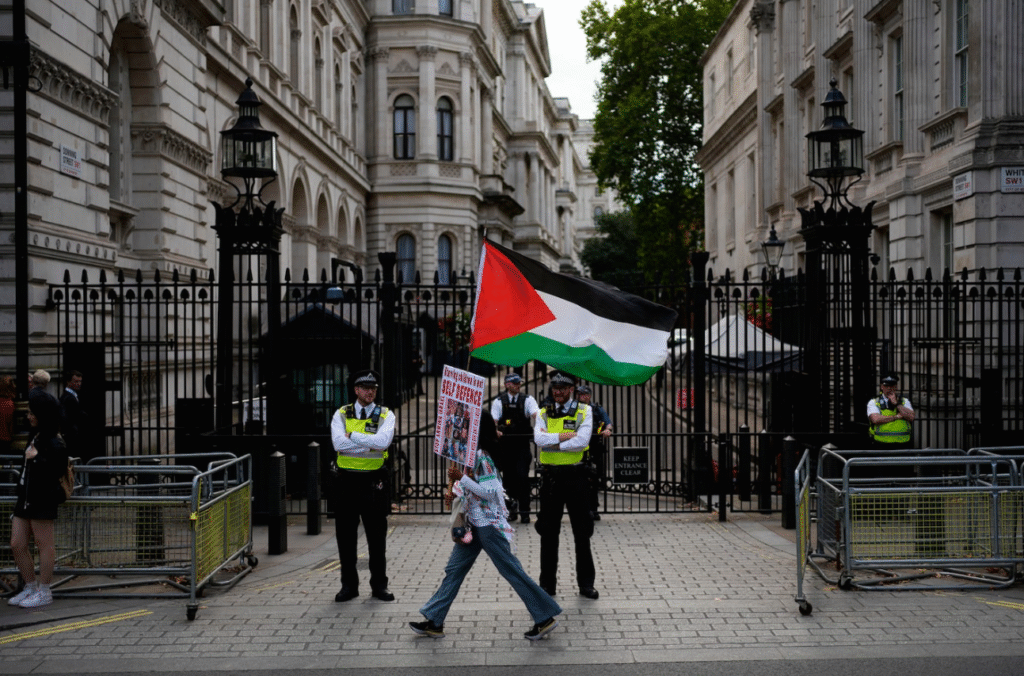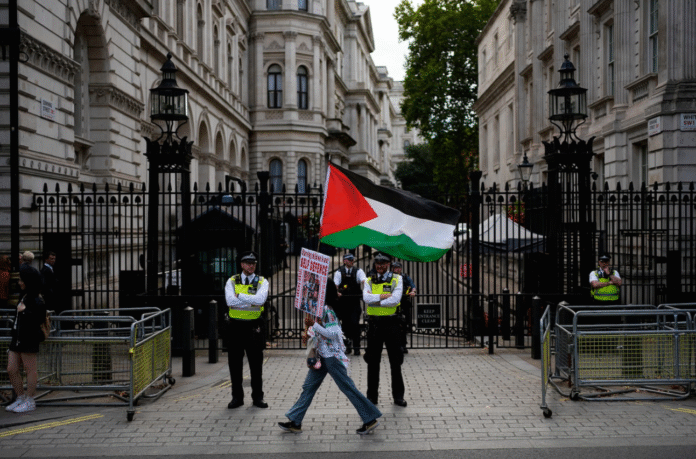Palestine Recognition Poll: Majority of Britons Oppose Starmer’s Plan
The latest Palestine recognition poll has revealed a striking disconnect between Prime Minister Sir Keir Starmer and the British public. According to a survey conducted by JL Partners, nearly nine in ten Britons do not support recognising a Palestinian state without conditions, a result that has intensified the national debate ahead of Starmer’s expected announcement at the United Nations General Assembly.
Palestine Recognition Poll Shows Lack of Support
The Palestine recognition poll found that only 13% of Britons support granting Palestine statehood without conditions. Among Labour voters, this number dropped further to just 11%, showing that even Starmer’s own base is hesitant about unconditional recognition.
For voters considering a switch to Reform UK or those who have already defected, support was an even smaller 8%. This sharp decline highlights the challenges Starmer faces in holding together his coalition of supporters.

Majority Oppose Recognition While Hamas Holds Gaza
One of the most telling aspects of the Palestine recognition poll is the strong link voters make between recognition and Hamas’s current control of Gaza.
-
51% of Britons oppose recognition while Hamas remains in power and hostages remain in captivity.
-
40% believe statehood should only follow a ceasefire agreement and the release of hostages.
-
17% oppose recognition under any circumstances.
These figures reflect deep skepticism about timing and conditions.
Public Fears Rewarding Terrorism
According to the Palestine recognition poll, 52% of respondents believe recognising Palestine now would reward terrorism by giving Hamas leverage. This fear has been echoed by politicians across the spectrum, who argue that recognition before concrete steps toward peace would undermine Britain’s influence in negotiations.
Conservative leader Kemi Badenoch called the proposal a “reward for terrorism,” while families of Hamas hostages accused Starmer of “rewarding murderers.”
Disconnect Between Starmer and Voters
James Johnson, co-founder of JL Partners, said the Palestine recognition poll highlights a “serious disconnect” between Starmer and the British public.
“Only 13 per cent say the UK should recognise Palestine without conditions,” he explained. “Even among Labour voters, support is barely more than one in ten. The median view is clear, recognition must come with conditions such as a ceasefire and hostage release.”
Religious and Political Leaders Voice Concerns
The Chief Rabbi of the UK, Sir Ephraim Mirvis, described unconditional recognition of Palestine as a “historic error of foreign policy” that could obstruct peace rather than promote it. His warning added weight to concerns raised by politicians and families directly affected by the Hamas-Israel conflict.
International voices have also weighed in. Former U.S. President Donald Trump expressed disagreements with Starmer’s stance during a recent visit to London, arguing that recognition without safeguards would damage Britain’s leverage over both Israel and Hamas.
Background: Why This Palestine Recognition Poll Matters
This Palestine recognition poll comes at a critical moment. Starmer has indicated that he intends to move forward with recognition at the UN General Assembly later this month. However, the survey suggests the vast majority of Britons want to see specific conditions met before such a step is taken.
Those conditions include:
-
A lasting ceasefire in Gaza.
-
The release of hostages.
-
Guarantees of humanitarian aid deliveries.
Critics argue that skipping these steps could embolden Hamas while weakening Britain’s negotiating position.

Historical Context of Recognition
Around three-quarters of United Nations member states already recognise Palestine as a state. In 2012, the UN General Assembly granted Palestine the status of “non-member observer state.”
However, Britain has historically hesitated, preferring recognition to be tied to progress in peace talks. The Palestine recognition poll suggests the public remains committed to that cautious approach, even as political leaders debate a shift in policy.
Implications for Starmer’s Leadership
For Starmer, the Palestine recognition poll results pose a political risk. By moving forward with unconditional recognition, he risks alienating not just opposition voters but also a significant share of his Labour base.
If he backtracks, however, he could face criticism from international partners who are pushing for recognition as a symbolic step toward peace.
Conclusion: The Future of UK Policy on Palestine
The results of the Palestine recognition poll highlight just how divisive this issue remains in Britain. While some see recognition as a moral and political necessity, most Britons appear unwilling to support it without concrete commitments from Hamas and assurances of peace.
Starmer’s next move could define his leadership on the international stage. Will he follow through on recognition despite public opposition, or will he adopt a more cautious path aligned with the conditions most Britons demand?
Either way, the decision will have lasting consequences for Britain’s role in the Middle East peace process.

